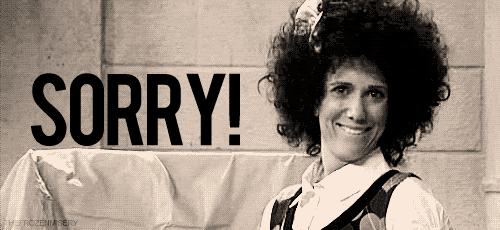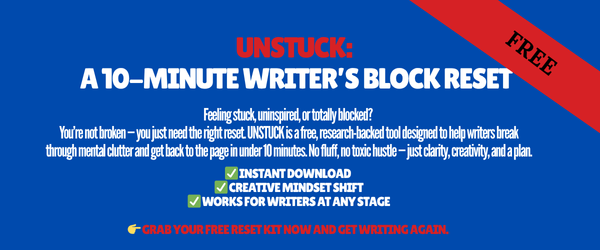The Truth About ‘Writer’s Block’ (Don’t Hate Me…)
Let’s get something straight: writer’s block doesn’t exist.
GILLY SAID IT BEST…
Yes, I’ve said this before, and yes, it’s controversial. And I have the social media threads to prove that this usually elicits a, let’s say… passionate response in people. But hear me out. What most people call writer’s block is just a lack of preparation.
It’s the moment where your story doesn’t hold together, your characters lose their drive, or you realize you’ve written yourself into a corner.
I know because I’ve been there. For years, I started scripts, got halfway through, and got stuck. Instead of pushing through, I’d jump to the next shiny idea, convinced this one would be different. Spoiler alert: it wasn’t. It wasn’t until I started focusing on planning and structuring my stories upfront that I actually began finishing my scripts.
The truth is, professional writers don’t have time for writer’s block. The difference between a script that gets written and one that gets abandoned is simple: preparation.
1. You Gotta Have A Beat Sheet (Yes, You Do.)
There is a special place in hell for the person who told us all that the key to writing is to “just write.”
Sure, that’s AWESOME when you are in the idea phase. Your word document might be thirty pages of ideas, but before you open Final Draft and actually write your script, you, my smart friend who doesn’t believe the lies you’ve been fed, must form a plan.
Every great story has structure—a beginning, middle, and end that feel inevitable yet surprising.
The beat sheet breaks your story into key moments: the catalyst, the midpoint, the climax, and more.
These beats are the backbone of your script, ensuring every scene has a purpose. Instead of charging into your draft with a vague idea, you’ll know exactly where your story is going and why.
When you spend time upfront creating a strong beat sheet, you eliminate those moments of doubt where you wonder, What happens next? You’ll also save yourself from weeks (or months—or years!) of rewriting to fix structural issues.
2. You Gotta Have a Theme (Sorry.)
I see this the worst in horror films: not having a theme will make your audience either not care enough to make it to the end or leave them feeling “eh.” Why? I think it’s our desire as human to learn something or take away a concept. That’s basically what a theme is.
Like, Jurassic Park is a fantastic movie. The theme is “Don’t Play God.” Without that as it’s backbone, the movie would be entertaining but probably NOT as much as you think.
So before you write 60 pages ask yourself: What is your story really about? Beyond the plot twists and action sequences, every great script has a theme—a central idea or message that resonates with the audience. It’s what makes a story memorable.
When you define your theme early, it becomes the compass that guides every decision you make. It keeps you focused and ensures that even the smallest moments in your script connect back to the bigger picture.
Without a clear theme, it’s easy to get lost in subplots or scenes that feel disconnected. With it, everything clicks into place.
3. You Gotta Start With CHARACTER FIRST (Seriously.)
Great characters are the key to great stories. They’re why we care about what happens and why we keep watching until the very last scene. But creating compelling, multidimensional characters is easier said than done.
For example, let’s say your protagonist is a detective solving a murder case. Instead of just focusing on the external plot, you’ll dive into their internal journey. What personal stakes make this case different? What emotional wound are they grappling with, and how does solving the case force them to confront it?
When your characters are well-developed, they practically write the story for you.
4. You Gotta Test It Before You Dive In (Really Important!)
Imagine this: you’re halfway through your script, and suddenly you realize the climax doesn’t make sense, or your second act drags, or your character arc falls flat. Cue panic and hours of rewriting.
This is why testing your story early is so important.
Think of it as stress-testing your story. By the time you sit down to write, you’ll have confidence that your structure works. No more mid-draft meltdowns or abandoned scripts.
5. You Gotta Stay Focused
One of the biggest obstacles to finishing a script is disorganization.
Maybe you have ideas scattered across notebooks, sticky notes, and random Word docs. Or maybe you’re trying to juggle your beat sheet, character bios, and scene outlines all at once.
When your tools are organized, your thoughts are organized. And when your thoughts are organized, you can focus on what really matters: writing.
The Bottom Line: Writer’s Block Is a Myth
Let’s stop romanticizing “writer’s block” as some inevitable part of the creative process. It’s not.
What we call writer’s block is often just a lack of planning, and the good news is that it’s entirely preventable.
Ready to break the cycle and finally finish your script?



